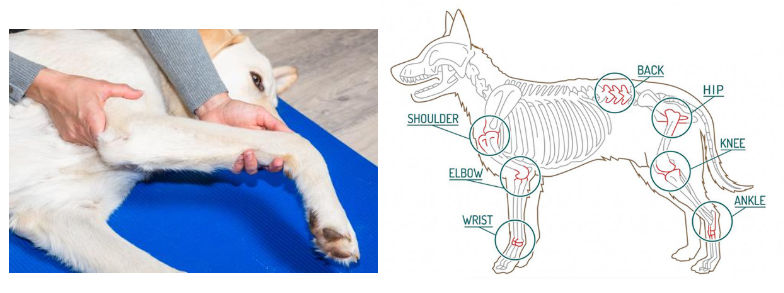We’ve heard of turmeric for inflammation, that’s a piece of cake.We’ve heard of probiotics; don’t really know what that is but, we know it helps with their gut, right? That’s simple enough. Okay now, what about Methylsufonylmethane? Uhhh not ringing any bells? What about its better known title “MSM”? Still not familiar? DO NOT FRET! We are here to give you the scoop on the supplements and lay down a good foundation so you can be more aware the next time you’re reading the label.
We got to dive into toppers in our last blog. One topic we covered was supplemental topper but how do we know which to use and why we’re using it? In this week’s blog we’ll be going over some key issues, the supplement names and benefits to the body. We want to prepare you so you know what to look for the next time you’re shopping for your animal.
Hip & Joint Supplements
The first issue we will be going over is achy joints and overall joint health. This is something to consider with any animal, especially bigger animals. The bigger an animal is, the more weight that’s on the joints which equals more stress on the cartilage. How can we help preserve and improve mobility function? Along with some light exercise, it's important to give your animal the necessary ingredients their bodies can use for joint restoration. Here are some that may not be super recognizable:
Glucosamine and Chondroitin:
These are naturally occurring substances found in cartilage. Supplements like glucosamine and chondroitin may help slow cartilage deterioration and reduce pain.
Omega-3 Fatty Acids (Fish Oil):
Omega-3s, found in fish oil, have anti-inflammatory effects that can help reduce joint pain and stiffness. They may be especially beneficial for those with rheumatoid arthritis and improve joint function, particularly in osteoarthritis.
Collagen Peptides/Hydrolysate:
Collagen is a major component of cartilage and may help improve joint health. Studies suggest that it could be particularly helpful in cases of osteoarthritis.
Methylsulfonylmethane (MSM):
MSM is commonly used for osteoarthritis, potentially reducing joint pain, swelling, and improving physical function.
Avocado-Soybean Unsaponifiables (ASU):
ASU is a natural vegetable extract that may reduce pain and stiffness in hip and knee.
Vitamin D:
Vitamin D plays a crucial role in bone health and may be beneficial for those with hip pain, especially if they have a deficiency.
Other Herbs and Spices
Turmeric:
Contains curcumin, a potent anti-inflammatory compound that can help reduce joint pain and swelling.
Ginger:
Gingerols in ginger have anti-inflammatory and antioxidant properties, which can help alleviate joint pain and improve mobility.
Yucca:
Contains phytosterols, which have steroid-like effects and can help reduce pain and inflammation associated with arthritis.
Alfalfa:
Rich in nutrients and has anti-inflammatory properties, making it a good supplement for joint health, especially for older dogs.
Cinnamon:
May help manage joint pain and swelling due to its anti-inflammatory properties.
Ashwagandha:
Reduces inflammation and can be helpful for dogs with arthritis or muscle pain.
Parsley:
Can help ease joint discomfort and enhance overall health in dogs.
Skin & Coat Supplements
Itchy skin, dry skin can be tricky to track down. It can be seasonal allergies, environmental allergies, food allergies or all of the above in some cases. Even if you have determined what is causing the problem you can always add more to boost immunity and lower the risk of a potential flare up. Some supplements are great for multi uses, so you may see some (now) more familiar faces from the last section.
Omega-3 Fatty Acids:
Help reduce inflammation and improve skin barrier function. Studies have shown that omega-3s can be effective in reducing itching and inflammation in some dogs with allergies.
Probiotics:
Probiotics can improve gut health, which is closely connected to the immune system. A healthy gut can mean a stronger immune response, potentially reducing the severity of allergic reactions that cause itching.
Colostrum:
Colostrum, the first milk produced by mammals, contains antibodies and growth factors that can support the immune system and potentially help with skin allergies.
Zinc:
Supports skin health, aids in wound healing, and helps maintain a healthy immune system.
Vitamin A: Important for skin cell growth and repair.
Vitamin E: An antioxidant that protects skin cells from damage.
B Vitamins: Support overall health, including skin health and may help with itchiness.
Common oils that are great for this are:
Coconut Oil:
A popular choice due to its moisturizing and antibacterial properties. It can be applied topically to soothe dry, itchy skin and hot spots, or added to food for overall skin health.
Fish Oil:
Rich in omega-3 fatty acids, which are essential for healthy skin and coat. It can reduce inflammation and itching associated with various skin conditions.
Flaxseed Oil:
Another good source of omega-3s, flaxseed oil can help moisturize the skin, reduce flakiness, and relieve itching.
Olive Oil:
Can be used to moisturize the skin and promote a healthy coat, but moderation is key when adding it to food due to its high-fat content.
Sunflower Oil:
Contains linoleic acid, which is important for skin and immune health.
Hemp Oil:
Offers benefits for skin health and can be a good alternative for dogs with allergies.
Another issues that shows up at the skin level are:
Tear Stain Supplements
Tear stains on dogs are reddish or brown discolorations that appear under a dog's eyes, caused by porphyrins, pigments in tears, and sometimes excessive tear production or drainage issues. Some things that can help with this are:
Cranberry:
Cranberry extract can help support the immune system, which may indirectly help with tear stains by reducing inflammation and infection.
Lutein:
This antioxidant is known to support eye health and may help to lubricate the mucous membranes, potentially reducing tear overflow.
Eyebright:
Eyebright has been traditionally used to soothe eye irritation and may help reduce tear production.
Omega-3 Fatty Acids:
These can improve coat and skin health, potentially reducing irritation that contributes to tear stains.
Vitamin C:
This antioxidant can support overall eye health and may help reduce the risk of cataracts, especially in older dogs
Probiotics:
Some supplements contain probiotics to improve gut health, which can influence the immune system and potentially reduce inflammation related to tear stains.
Marshmallow Root:
This ingredient can help soothe and lubricate mucous membranes, which can be beneficial in managing tear production.
Oregon Grape Root:
This herb is known for its anti-inflammatory and antimicrobial properties, which can be helpful in addressing the underlying causes of tear stains.
Gut Health Supplements
The term Probiotic keeps coming up, what the heck is even that? Probiotics are live microorganisms, like bacteria and yeast, that can provide health benefits when consumed, often by improving or restoring the balance of bacteria in the gut. The term as you noticed pairs with the words ‘gut health’. Gut health is crucial for overall well-being, influencing digestion, immunity, mental health, and even chronic disease risk. A healthy gut, characterized by a balanced microbiome, plays a vital role in nutrient absorption, immune function, and preventing inflammation.
Common strains found in dog probiotics include:
Bifidobacterium animalis
Bifidobacterium bifidum
Bacillus coagulans
Enterococcus faecium
Lactobacillus acidophilus,
Lactobacillus casei
Lactobacillus plantarum
Lactobacillus rhamnosus
Probiotics can be particularly helpful during times of stress, illness, or after antibiotic use, which can disrupt the natural balance of gut bacteria.
Prebiotics:
These are non-digestible fibers that act as food for the beneficial bacteria in the gut, essentially helping them thrive and multiply. Inulin and psyllium husk are examples of prebiotics that can be found in dog supplements.
These are found in foods such as:
Pumpkin.
Sweet Potato
Beet pulp.
Lentils.
Beans.
Peas.
Flaxseed.
Raw oats.
Digestive Enzymes:
These supplements contain enzymes that help break down food, making it easier for the dog to absorb nutrients.
Examples of digestive enzymes include:
Amylase
Protease
Lipase
Which help digest carbohydrates, proteins, and fats, respectively.
Allergy Supplements
Dogs can have allergies, just like humans, and these allergies can manifest in various ways, most commonly affecting the skin. As we have gone over, common symptoms include itching, scratching, and skin irritation, which can also lead to secondary infections. Other symptoms can include ear infections, digestive issues, and even respiratory problems in some cases. How can we help reduce these symptoms through various supplements?
Omega-3 Fatty Acids (Fish Oil):
Omega-3s, particularly EPA and DHA, help reduce inflammation, which is a key component of allergic reactions. They also support skin barrier function, making it more resistant to allergens and reducing dryness and itching
Probiotics:
A healthy gut microbiome is crucial for a strong immune system. Probiotics help balance the gut bacteria, which can reduce the severity of allergic reactions and improve overall immune function
Quercetin and Bromelain:
Quercetin is a natural antihistamine, while bromelain helps with its absorption and also has anti-inflammatory properties. They can help reduce itching, inflammation, and other allergy symptoms
Other Helpful Supplements:
Nettles:
A natural antihistamine that can be helpful for managing allergy symptoms.
Chinese Skullcap: A natural antihistamine that can lower histamine levels and reduce the inflammatory response to allergens.
L-Theanine:
Can help calm and reduce anxiety, which may be exacerbated by allergies.
Colostrum:
Contains antibodies and immune factors that can help support the immune system.
Licorice Root:
Known for its anti-inflammatory and soothing effects, licorice root can help relieve itching and irritation caused by allergies. It also supports the immune system and liver health.
Chamomile:
Offers anti-inflammatory and antiseptic properties, helping to reduce swelling and itching associated with allergies. It can be used topically or added to food.
Rehmannia:
Nourishes the body's yin essence and blood, which is crucial for maintaining skin health and integrity. It helps alleviate dryness and itching.
Aloe Vera:
A soothing herb with anti-inflammatory and antibacterial properties, aloe vera can help calm irritated skin and support the immune system.
Echinacea:
Boosts the immune system, helping the body better manage allergic reactions.
Burdock Root:
Acts as a detoxifier, supporting liver health and aiding in the elimination of allergens.
Turkey Tail Mushroom:
Rich in antioxidants and can help modulate the immune system.
Urinary Supplements
Urinary issues in dogs can manifest in various ways, including increased frequency of urination, straining to urinate, blood in the urine, and urinary accidents. These symptoms can be caused by several conditions, such as urinary tract infections (UTIs), bladder stones, urinary incontinence, bladder tumors, and even kidney problems. Several supplements can support urinary health, primarily by promoting a healthy urinary tract and potentially preventing or alleviating urinary tract infections (UTIs):
Cranberry:
Cranberry supplements, often available as capsules or gummies, are well-known for their ability to prevent UTIs. They contain compounds called proanthocyanidins that prevent bacteria from sticking to the urinary tract walls.
D-Mannose:
This sugar may help prevent UTIs by binding to bacteria in the urinary tract, preventing them from adhering to the bladder lining.
Probiotics:
Probiotics, which are beneficial bacteria, can help maintain a healthy balance of bacteria in the urinary tract, potentially reducing the risk of UTIs.
Vitamin C:
Vitamin C can increase urine acidity, making it a less hospitable environment for bacteria.
Uva Ursi:
This herb has traditionally been used to treat UTIs and may help cleanse the urinary tract and balance urinary pH.
Garlic:
Garlic has antimicrobial properties and may help fight off bacteria that cause UTIs.
Potassium citrate: Helps increase the pH of urine, which can be beneficial for dogs prone to certain types of bladder stones.
Echinacea:
Can help support the immune system and reduce inflammation.
Nettle Root:
May help with inflammation and can also help eliminate excess salt and water.
Marshmallow Root:
Marshmallow root is known for its soothing and anti-inflammatory properties.
It can help calm irritated urinary tract tissues and promote overall bladder health.
In conclusion, there are many different options to add to your dog’s life and some are even multi-purpose! We hope this blog helped explain a bit more of the label for you! Now you have a rough guide on what to look for when you need it for your canine. Please feel free to stop by the shop and talk to staff about supplements you’re interested in or want to learn more about!
.png)






